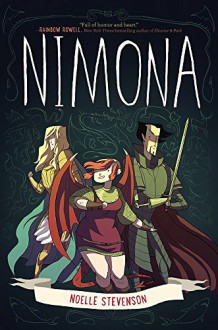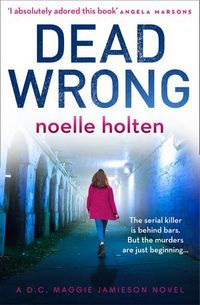
The author was kind enough to participate in a quick Q&A--A Few Quick Questions with the Author, Noelle Holten! Also, this book releases tomorrow--be sure to grab it (still time to pre-order). While you're at it, get the first in the series, too!
Last year, Noelle Holten blew my socks off with her debut, Dead Inside. It was the first of the Maggie Jamieson novels—although, I mentioned at the time "you'd be excused if you didn't pick that up until the last chapter," because it focused so much on a side character.
This time out, the focus is almost exclusively on Maggie—her professional side as well as her personal life. Before Dead Inside, Maggie had been part of a Homicide investigation team but had been reassigned to help her decompress after a stressful investigation that resulted in Bill Raven, a confessed serial killer, getting a life sentence. It ended with Maggie getting a voice mail from her old boss:
‘Your secondment is over at the DAHU. Raven has appealed his sentence, claimed he’s innocent. Timely I’d say as there has been another murder. Either a copycat or the real killer picking up where they left off. Get your arse in here.’
It turns out that it's a bit more than "another murder." It's actually the murder of the woman Raven claimed was his first victim. Which doesn't seem like a big deal, everyone knew she was dead. The twist comes when the report comes in that she's been dead two days.
Say what you will, being locked up already for someone's murder is a pretty good alibi for their actual murder. Many people—including fellow police officers and detectives--and the Press are outraged. Maggie's previous work is being scrutinized, she's having to defend her actions in the past while investigating the new murder (okay, it soon becomes murders—including more women that Raven claimed to have killed). She's also doing everything she can to keep Raven behind bars—but that's an unofficial goal. Officially, she's supposed to stay away from revisiting the original investigation.
Now, the idea of a detective having to deal with an old investigation being re-opened because the convicted killer is making a case for their release isn't new—Bosch had to deal with it in Two Kinds of Truth, Poe dealt with it in Black Summer, even the great Capt. Raymond Holt had to endure this kind of thing. But none of them had to explain how some of the victims turned out to have been recently alive. There's more to differentiate Maggie's challenge than that, but it's a good start. Whoever is behind these killings is clearly some sort of monster, and sussing out the motive and means may prove as difficult as finding whoever's responsible.
While the brass are inclined to believe Raven's claims that he was delusional from drugs and a psychiatric condition when he confessed, Maggie only has a couple of sympathetic colleagues—an old friend who is now her DS and a psychologist she befriended on her temporary assignment, Kate Moloney.
Kate ends up consulting for the investigation for the new murders, helping the team think of their evidence in new ways, and helping Maggie better understand Raven and who he may have been working with while incarcerated to do the killing.
We see both women at work and at home—their home situations are almost as troublesome and stress-inducing as the hunt for the "real killer." But, relying on each other, and their respective strengths, they're able to muddle through—and even have a little fun. It's an early Tony Hill/Carol Jordan-type relationship (I want to stress the "type," because they're all very different people and Holten isn't trying for a clone in any sense).
I should add quickly that we do get to see Lucy, who is still working through the issues revealed in Dead Inside, but seems to be doing really well (all things considered). We don't spend much time with her, but the way it's done leaves the possibility for her to return to the books.
What about Bill Raven, our potentially falsely-convicted killer? It's pretty late in the book when the reader gets a firm answer about his guilt. But we learn a few things about him right away. He's arrogant, confident, enjoys playing with Maggie (and other detectives), and there's just something about him that's "off" (for lack of a better description). Whether or not he's ultimately found to have committed the crimes he enjoys the attention and is hopeful for what the new murders mean for his release. The source of his derangement, and exactly why he's doing what he's doing is hinted at—and I think he alters his approach during the novel (or maybe I just don't understand him enough).
Unlike most of the British Police Procedurals I've read the last few months, Dead Wrong primarily uses three characters for the Points-of-View (Maggie, Raven and Kate)—making it really easy to keep track of everyone. We do see a little from Maggie's DI, and a couple of the victims in their last moments, too.
Speaking of the victims, and I mention this because I know the tastes of a lot of my readers. I should spend a minute talking about what befalls these women (and they are primarily women). However, and isn't this a pleasant change, there's nothing sexual about what happens to them. There's not a hint, suggestion or implication of any rape or similar abuse. They are held captive—and what happens to them is truly horrifying, make no mistake, but it's not your typical fictional serial killer thing. There's no torture, either. At least not as you normally think about it. (what happens has to be tortuous, I assure you) we get a couple of pages' worth of the female victims point-of-view, but even it isn't as fear-filled as typically portrayed. There is soul-crushing despair, but done in a way I rarely, if ever, see.
I have an idea or three about where Holten is going with this, and if I'm even close to being in the right ballpark, let me say that I'm not a fan. Not that I don't think it'll be gripping reading, I'd just like things to go a little better for Maggie than I think they're going to.
There are a couple of things I'm not crazy about. Once or twice, Maggie's reaction to something feels a little over-dramatic/melodramatic. And there are a few things that I would have preferred given to us with greater detail (for example, someone is arrested for their role related to the investigations—and we're only told that and have to make ill-informed guesses about what their actions have done to alter the police's work).
That said, I really enjoyed this book—it's a real slow boil of a book, things start bubbling pretty soon, but you have to wait and wait and wait for that to become a full-fledged rolling boil. Holten's great at making sure you know there's tension and malfeasance afoot, even if she doesn't allow it to take over the novel. It's well-plotted and well-executed, allowing the momentum to build so the reader is fully hooked before the plot really gets moving. Dead Inside concluded with a sentence or two past that voicemail. Dead Wrong ends on a similar note, propelling the reader on to the next book.
Dead Wrong didn't wow me as much as its predecessor did—for one thing, I now know what Holten is capable of, and expect it—also, the nature of the story was is a bit more traditional than the last one was. While my theories while reading were wrong more often than right with Dead Wrong, I still had a pretty solid idea where the plot was going all along (until the very end, that is)—so it took a little of the luster off. Not much though, I'm still sure this is going to go down as one of the best things I read in 2020. I'll wager the same is true for you.
Disclaimer: I received this eARC from HarperCollins UK, One More Chapter via NetGalley in exchange for this post and my honest opinion—thanks to both for this.


 Log in with Facebook
Log in with Facebook 










